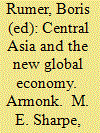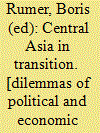|
|
|
Sort Order |
|
|
|
Items / Page
|
|
|
|
|
|
|
| Srl | Item |
| 1 |
ID:
001928


|
|
|
|
|
| Publication |
New York, M E Sharpe, 1998.
|
| Description |
ix, 307p.
|
| Standard Number |
0765602547
|
|
|
|
|
|
|
|
|
|
|
|
Copies: C:1/I:0,R:0,Q:0
Circulation
| Accession# | Call# | Current Location | Status | Policy | Location |
| 043135 | 338.958/RUM 043135 | Main | On Shelf | General | |
|
|
|
|
| 2 |
ID:
046394


|
|
|
|
|
| Publication |
DelhI, Aakar Books, 2003.
|
| Description |
x, 307p.
|
| Series |
Central Asian Studies
|
| Standard Number |
818787905x
|
|
|
|
|
|
|
|
|
|
|
|
Copies: C:1/I:0,R:0,Q:0
Circulation
| Accession# | Call# | Current Location | Status | Policy | Location |
| 046479 | 338.900958/RUM 046479 | Main | On Shelf | General | |
|
|
|
|
| 3 |
ID:
053648


|
|
|
|
|
| Publication |
Armonk, M.E.Sharp, 2004.
|
| Description |
xiii, 442p.
|
| Standard Number |
0765608669
|
|
|
|
|
|
|
|
|
|
|
|
Copies: C:1/I:0,R:0,Q:0
Circulation
| Accession# | Call# | Current Location | Status | Policy | Location |
| 045951 | 320.958/RUM 045951 | Main | On Shelf | General | |
|
|
|
|
| 4 |
ID:
046287


|
|
|
|
|
| Publication |
Armonk, M. E. Sharpe, 2000.
|
| Description |
xiii, 288p.
|
| Standard Number |
0765606291
|
|
|
|
|
|
|
|
|
|
|
|
Copies: C:1/I:0,R:0,Q:0
Circulation
| Accession# | Call# | Current Location | Status | Policy | Location |
| 046206 | 338.958/RUM 046206 | Main | On Shelf | General | |
|
|
|
|
| 5 |
ID:
063019


|
|
|
|
|
| Publication |
Armonk, M. E. Sharpe, Inc., 2005.
|
| Description |
xiii, 448p.
|
| Standard Number |
0765615754
|
|
|
|
|
|
|
|
|
|
|
|
Copies: C:1/I:0,R:0,Q:0
Circulation
| Accession# | Call# | Current Location | Status | Policy | Location |
| 049788 | 958.043/RUM 049788 | Main | Withdrawn | General | |
|
|
|
|
| 6 |
ID:
071381


|
|
|
|
|
| Publication |
London, M E Sharpe, 2005.
|
| Description |
xiii, 448p.hbk
|
| Standard Number |
0765615754
|
|
|
|
|
|
|
|
|
|
|
|
Copies: C:1/I:0,R:0,Q:0
Circulation
| Accession# | Call# | Current Location | Status | Policy | Location |
| 051185 | 958.043/RUM 051185 | Main | On Shelf | General | |
|
|
|
|
| 7 |
ID:
006576


|
|
|
|
|
| Publication |
New York, M E Sharpe, 1996.
|
| Description |
xvii, 286p.
|
| Standard Number |
0563247606
|
|
|
|
|
|
|
|
|
|
|
|
Copies: C:1/I:0,R:0,Q:0
Circulation
| Accession# | Call# | Current Location | Status | Policy | Location |
| 038305 | 338.958/RUM 038305 | Main | On Shelf | General | |
|
|
|
|
| 8 |
ID:
046393


|
|
|
|
|
| Publication |
DelhI, Aakkar Books, 2003.
|
| Description |
xx, 286p.
|
| Series |
Central Asian studies
|
| Standard Number |
8187879041
|
|
|
|
|
|
|
|
|
|
|
|
Copies: C:2/I:0,R:0,Q:0
Circulation
| Accession# | Call# | Current Location | Status | Policy | Location |
| 046480 | 338.900958/RUM 046480 | Main | On Shelf | General | |
| 055935 | 338.900958/RUM 055935 | Main | On Shelf | General | |
|
|
|
|
| 9 |
ID:
022411


|
|
|
|
|
| Publication |
2002.
|
| Description |
57-68
|
| Summary/Abstract |
In the post-Soviet 1990s, the three key players in the geopolitical space around Central Asia – Russia, China and the United States – achieved a provisional equilibrium. Russia maintained its traditional dominance in its former southern provinces. China, as it developed its economic relations with the Central Asian countries, gradually increased its own political influence, while seeking to avoid confrontation with Moscow. The United States, despite its preoccupation with other areas of greater strategic significance, kept a wary eye on the region. After 11 September, this alignment of power has changed: the United States is now the region's main economic donor and security manager. The Bush administration needs to think clearly about the advantages and disadvantages of US dominance in Central Asia. The American presence in Central Asia threatens to offend Russian nationalistic sensibilities and make Putin's pro-US policy domestically very difficult. The optimal US approach to Central Asia is to establish leadership there in partnership with Russia. It is not in the American interest to corner Putin and deny him the opportunity to continue his policy of integrating Russia with the West.
|
|
|
|
|
|
|
|
|
|
|
|
|
|
|
|
|
|
|
|
|